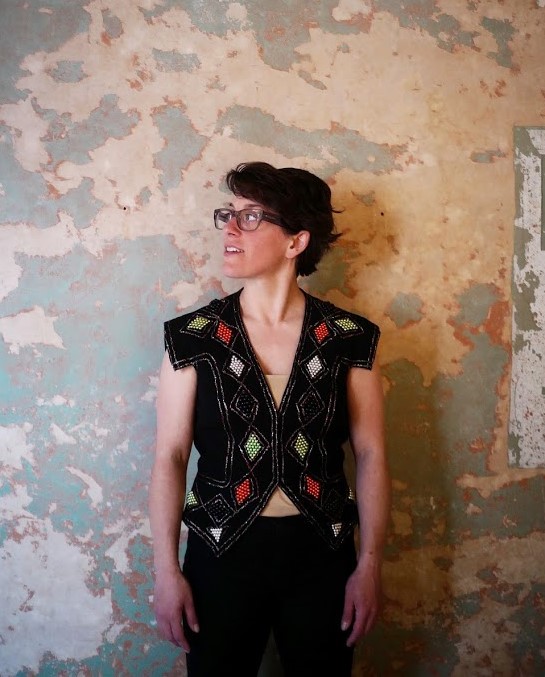Tamara talks about her first solo piece that brings to life the true stories of two Holocaust survivors and one of their descendants.
Tamara was an M.Phil student at Lucy Cavendish in 2010-11, studying Modern Languages and researching the work of the French playwrights Molière and Desmarais de Saint-Sorlin. During this time she was also writing her own plays and in 2011 was awarded the Alumnae Association Prize for Contribution to the Arts.
Tamara’s first play Fantasmagoriana was performed at the ADC and then moved on to the Edinburgh Fringe in 2011, after which she continued her playwriting in London, as part of the Royal Court Young Writers’ Programme, with her next piece What You’re Missing being performed at The King’s Head in Islington in 2014.
This autumn will see Tamara’s first solo piece Holocaust Brunch, to be premiered at the artsdepot in North Finchley on October 17th. Details and bookings can be found here:
https://www.artsdepot.co.uk/canada-season-theatre/holocaust-brunch

Photos credit: Sophie le Roux
After the premier in London, Tamara will take the play to Vancouver, where the characters in the play lived and where Tamara herself was born and raised. English audiences will have another opportunity to see the play in January at The Place Theatre in Bedford We also hope that Tamara will be successful in performing in Cambridge in the near future. An original aspect of the show is that bagels are served during the performance – hence the ‘brunch’ of the title.
Details of The Place Theatre, Bedford can be found here:
https://twitter.com/ThePlaceBedford
https://www.facebook.com/pg/ThePlaceBedford
Her story, which Tamara calls ‘a dark comedy’, concerns Isaac and Bluma Tischler, the Jewish grandparents of a close friend, who left a memoir and oral history detailing their lives in pre-war Poland and their subsequent journey through post-war Germany to Canada. In addition to Isaac’s 250-page written memoir, Tamara had access to seven hours of audio recordings made by Bluma, where she recorded her personal experiences of that time. When Tamara read their story she found it compelling in its originality and felt that she had to bring it to the stage. She recognised that in doing so she would need to deploy immense sensitivity and maintain the trust of Isaac and Bluma’s living relatives, who offered the story to her to tell. One of her central concerns is how we honour memories of the past whilst breaking free from them – and the obligations placed upon us in the attempt to represent the lives of those now dead. In Holocaust Brunch she therefore explores her experience as a descendant of war survivors, and how that legacy continues to affect us two generations after the Second World War.
Isaac and Bluma were both born in eastern Poland before the war, and witnessed the Russian invasion in 1939, after which Isaac was conscripted to the Red Army, which confronted the Nazi attack from the west in 1941. Isaac was invalided out of the war and moved to a convalescing hospital in Tajikistan, where he met Bluma at medical school, most of her family having escaped from war-torn Poland.
Isaac came from a working-class family and was the first to enter the professions, whereas Bluma’s parents were both qualified professionals (her mother Stera being the first female and first Jewish graduate of dentistry in Odessa, Ukraine). The two young people, after marrying in Lemberg, completed their medical school education in Munich during the post-war de-Nazification period, after which they emigrated to Canada. Bluma became a renowned paediatrician and was awarded the Queen’s Silver Jubilee Medal in 1977 for her service to children’s health. The couple remained in Vancouver for the rest of their lives.
In Tamara’s venture to bring the lives of Isaac and Bluma to a modern audience, she collaborated with London-based printmaker L. Roberts, who created a set of prints that correspond to scenes from Holocaust Brunch and add an emotional, visual element to the characters’ journeys over the course of the show. The two began this collaboration earlier this year during a short residency at Cambridge Junction.
When asked what advice Tamara would give to others who may have ambitions to write for the theatre, she replied, “Just keep doing it – persevere with your intention!”. She added that it is helpful to find a community of people in the sector who can offer support, company and practical advice. So, to all our budding alumnae writers – take confidence from Tamara’s lead and get writing!
By Tamara Micner. European Literature, 2010
The opinions expressed in this article are the author’s own and do not necessarily reflect the view of Lucy Cavendish College or the Lucy Cavendish College Alumnae Association.




